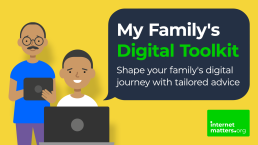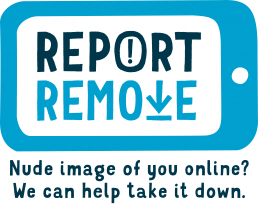News & New Resources
Make sure your home doesn't have an open door to child sexual abusers.
Increasingly, young people are being contacted in their own homes on online platforms and apps and asked for sexual pictures and videos, while their parents and carers are totally unaware.
Follow IWF TALK checklist to help keep your child safe online.
My Family's Digital Toolkit
Get your personalised online safety toolkit in a few easy steps. Get age-specific advice to support your children online. Learn about popular apps and platforms your children use. Get information about how to deal with any online safety concerns. Get recommendations for digital tools to support their interests and wellbeing
How Ofcom is helping children to be safer online – a guide for parents
Ofcom have set out these new measures that online services must take to improve their safety measures, especially to protect children. That means preventing children from encountering the most harmful content relating to suicide, self-harm, eating disorders and pornography. Sites and apps must also act to protect children from misogynistic, violent, hateful or abusive material, online bullying and dangerous challenges.
AI-generated imagery of child sexual abuse has progressed at a “frightening” rate, reveals a report update from the IWF
The Internet Watch Foundation (IWF) is seeing the first realistic examples of ‘deepfake’ AI videos depicting the sexual abuse of children, created by offenders using AI tools to add the face or likeness of a child to an existing video, as well as rudimentary, fully synthetic videos.
Guidance and help about how to talk to your children about life online and the different issues and dangers they may face.
Guidance on how to set parental controls and privacy settings.
Helpful resources and guidance to help support parents and carers with children who may be more at risk of online harms, including children with additional needs.
Find out about setting screen-time limits and helping children moderate their own habits and finding the right balance for your family's needs
Find out in this section the various ways you can make a report if you are worried about anything you or your child come across when online.
Find out about all about Artificial Intelligence (AI). You will find updates and guidance on the potential risks and benefits to AI.
Online gaming means you can play in real time with people across the world through a computer, games console, tablet or smartphone connected to the internet. Games can offer children a world of adventure to immerse themselves in, but it’s important to understand how children can stay safe and what games are appropriate for their age.
Links to useful websites such as Childnet, ThinkUKnow, Internet matters and many more for further help and advice
What is digital wellbeing? With the online world being such a huge part of young people's lives today, it's very important that we help them to understand how to use it safely, sensibly and with an awareness of how it can impact on them.
Find out what cyberbullying is and how you can help your child.
Social networking sites such as Instagram and Facebook are popular with young people, even those who are of primary age. These types of sites allow young people to be incredibly creative online, keep in touch with their friends as well as sharing photos and videos. Learn about the apps your children are using
Find advice on the messaging and video apps that let you send messages, share photos, and make video or voice calls.
Help and advice from various organisations on how to help children make safer choices about who they talk to and what they share online.
Digital platforms have made it easier for anyone to share information online, and it can be difficult to determine whether something is real or false.
What a young person sees online can shape how they view the world and impact their overall wellbeing. It’s important to talk to them about how misinformation spreads and how to look out for it.
Online hate speech is a type of speech that takes place online with the purpose of attacking a person or a group based on their race, religion, ethnic origin, sexual orientation, disability, and/or gender. Here you will find some useful resources to help you and your child understand facts and the impact of online hate.
Cyber security means protection in the online space. Therefore, it can refer to the security settings you use on your online social and video gaming accounts or the software you use on your family’s devices.
Here, you'll discover tips and insights on different apps where you can buy and sell items. Additionally, learn how to ensure safety for both you and your child while shopping






